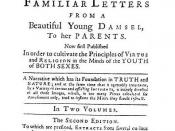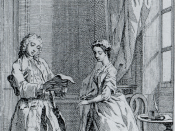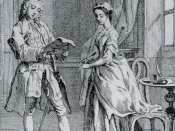In Pamela, Richardson sets up an interesting conflict between the idea of the definition of virtue, and what self proclamation of virtue and self righteous appraisal can do to taint this notion. By many accounts, Richardson was a feminist who believed in strict morals, and who's most despicable characters still had religious standards. Pamela was born from a strict set of beliefs, but whether these are shown in a convincing light through the novel is clearly an issue to be debated. Richardson seems to suggest that virtue is not an amalgamation of manners, ideals, and principals which align to create a godly and pure existence, but instead, to suggest that virtue only exists alongside virginity. Fielding does not subscribe to this idea, and in Shamela, somehow creates a character who is more believable, and more of an ode to the female as a force to be reckoned with.
Pamela on the other hand is presented as someone who lives by the book, an unimaginative and stoic rule-follower, who still maintains the traditional role of the female: the keeper of morals through the guise of meek femininity.
Surely the fact that Pamela is constantly striving towards virtue implies that it is perhaps not a natural state of grace, and that it is something to be attained in the face of adversity. Virtue can be seen therefore as a prize, and not as a purely selfless state of being, it is a conscious decision, a goal. The pressures placed on Pamela from her mother and father, from the expectations of society, and from her own personal goal to maintain her 'pure' state somehow belittle their effect: is virtue a state of being or a conscious decision to align oneself with the common state of expectation. Does virtue come from within,


